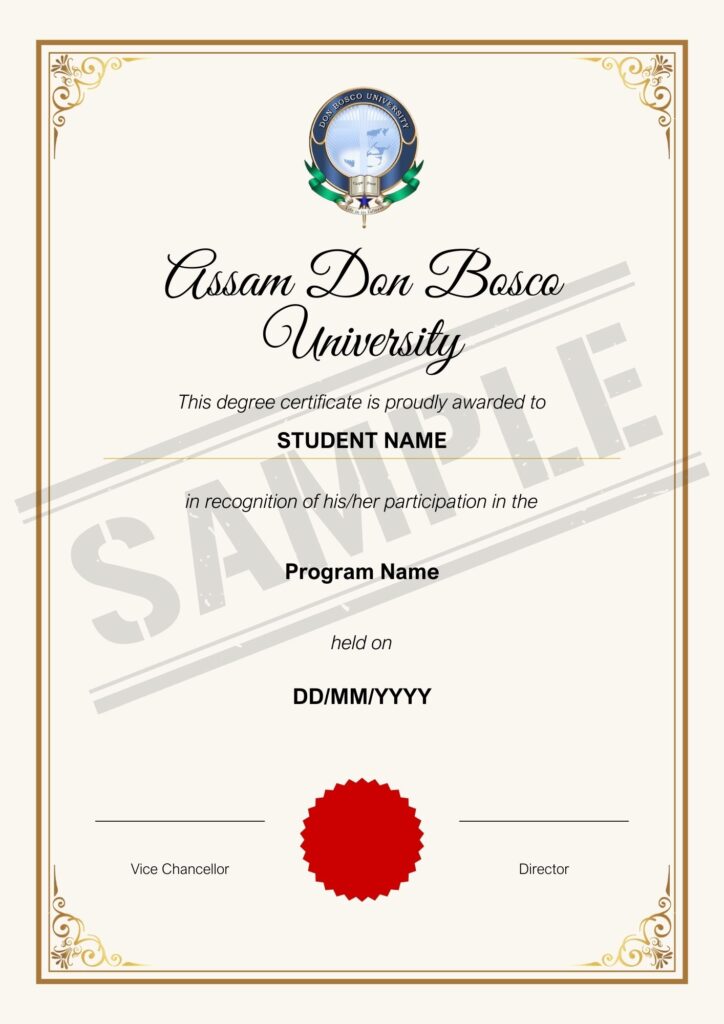Test Program
M Tech in Electrical and Electronics Engineering
Duration: 02 Years
No. Of Seats: 24
M.Tech in Electrical and Electronics Engineering
The M.Tech in Electrical and Electronics Engineering at Assam Don Bosco University is a specialized two-year program designed to equip students with advanced knowledge and skills in the dynamic fields of electrical and electronics engineering. The curriculum focuses on cutting-edge technologies such as power systems, control systems, communication, and embedded systems, preparing graduates for leadership roles in the industry. Students engage in rigorous academic training complemented by hands-on experience in research and development. The program also emphasizes innovation, problem-solving, and interdisciplinary learning, ensuring graduates are at the forefront of the ever-evolving tech landscape. With access to state-of-the-art labs, experienced faculty, and industry collaborations, this program is ideal for those aspiring to excel in both academia and industry.
Electrical and Electronic Engineering:
Power Systems and Power Electronics
Instrumentation and Control

Program Highlights and Advantages
Discover our Degree Programs and begin an exciting educational journey

Advanced Curriculum
Comprehensive courses in power, control, and embedded systems.

Cutting-Edge Infrastructure
Access to modern labs and research facilities.

Industry Integration
Collaboration with leading industries for real-world applications.

Expert Faculty
Learn from experienced professors with academic and industry expertise.
Program Overview & Structure
| Linear Algebra and Random Processes |
| Digital Signal Processing |
| Specialization 1: Power Electronics and Power Systems |
| Advanced Power Electronics |
| Switchgear and Advanced Power System Protection |
| Application of Power Electronics in Power System |
| Specialization 2: Control and Instrumentation Engineering |
| Advanced Control Systems |
| Optical Electronics |
| Industrial Instrumentation |
| Specialization Lab 1 |
| Digital Signal Processing Lab |
| Research Seminar I |
| Optimization theory and applications |
| Embedded systems and application |
| Research Methodology and Statistical tools |
| Specialization 1:Power Electronics and Power Systems |
| Advanced Electric Drives |
| Advanced Power System Analysis |
| Power system interconnection and control |
| Specialization 2:Control and Instrumentation Engineering |
| Advanced Instrumentation |
| Optimal Control Systems |
| Process control instrumentation |
| Specialization Lab 2 |
| Research Seminar |
| Project Phase I |
Project Phase II
Degree offered by us

Eligibility & Class Timing
Eligibility Criteria
Graduation/Post Graduation in an appropriate area of Engineering/Science with a CGPA of 6.5/10 or 60% in the aggregate in the qualifying examination.
Class timings
The classes are scheduled from 1:30 pm - 5:30 pm, Monday to Friday
Career Impact
How We Help You Build Your Dream Career
R&D Leadership
Opens doors to top-tier research and development positions.
Industry Expertise
Prepares for key roles in power systems, automation, and electronics.
Academic Advancement
Strong foundation for pursuing Ph.D. programs and teaching careers.
Entrepreneurial Ventures
Encourages innovation and entrepreneurship in tech domains.
F.A.Q.
The university offers a range of undergraduate, graduate, and doctoral programs across disciplines including engineering, science, arts, business, and health sciences. Each program has its own specific requirements and areas of focus.
You can apply online through our university’s admissions portal. Complete the application form, submit the required documents (such as transcripts, test scores, and recommendation letters), and pay the application fee. Detailed instructions are available on our admissions webpage.
Admission requirements vary by program. Typically, undergraduate programs require a high school diploma and specific academic credentials, while graduate programs may require a bachelor’s degree in a related field, relevant test scores, and work experience. Be sure to review the specific requirements for the program to which you are applying.
Yes, the university offers a variety of scholarships and financial aid programs based on academic merit, financial need, and other criteria. Information about available scholarships and how to apply is available on the university’s financial aid webpage.
Application deadlines vary depending on the program and the intake period (e.g., fall, spring). Be sure to check the program’s admissions page for specific deadlines.
